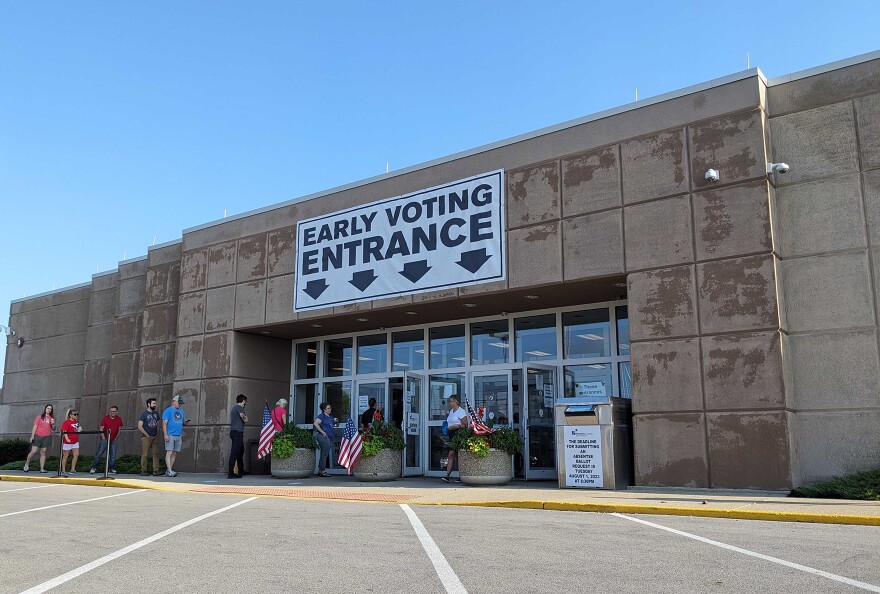The number of early votes cast in Ohio for the 2024 general election have surpassed the last general election before the pandemic in 2016, showing signs the practice of casting ballots before Election Day is increasing.
Since early voting began on Tuesday Oct. 8, more than 2.2 million ballots have been mailed in, dropped off at county boards of elections or cast by in-person early voters. In 2016, less than 1.9 million voters cast ballots using these methods. There are still three days of early voting left.
Compared to 2020 — when many people voted early in-person or by mail because of the COVID-19 pandemic — the number of early voters has dropped significantly. This is most pronounced in the mail-in voting numbers.
This is according to data from the Ohio Secretary of State's election results archives and the new early voting dashboard as of Friday afternoon.
How many people have voted early in Ohio and its largest communities?
In 2020, 2.1 million people cast ballots by mail in Ohio. This year, nearly 1.2 million people requested absentee ballots and only 910,000 people have returned the absentee ballots so far.
However, the early in-person vote in 2024 may still reach 2020 levels. As of Friday afternoon, almost 1.3 million people have cast ballots early in-person with Sunday being the last day to vote early. In 2020, that number reached more than 1.3 million people.
The state is averaging about 75,000 people voting early in-person every day.
According to demographic data from the Ohio Secretary of State's early voting dashboard, Ohio's early voting population is skewing older and is more Republican than Democrat.
Almost 1 million people have voted early that are over the age of 65. About 1.2 million people between the ages of 18 and 64 have voted early so far.
Voters unaffiliated with a major political party make up the vast majority of voters in Ohio at almost 1.3 million. Around 671,000 Republicans have voted early in comparison to the estimated 414,000 Democrats who have voted early.
In Franklin County, which is the state's largest county, early voting is tracking alongside statewide trends compared to 2016 and 2020. As of Friday, more than 215,000 people have voted early compared to 227,000 people in 2016 and 376,000 in 2020.
In Cuyahoga and Hamilton counties, where Cincinnati and Cleveland are located, there are differences.
Cuyahoga County had 232,000 early ballots cast in 2016. In 2020, that jumped to 372,000. This year so far, 187,000 have voted early so far with three days remaining. Since 2016, Cuyahoga County's population has declined.
Hamilton County had 112,000 people vote early in 2016 and 251,000 vote early in 2020. This year, Hamilton County has already surpassed its 2016 levels with 142,000 people voting early with three days remaining.
The Ohio Secretary of State's database also shows some counties are lagging behind others in the rate at which mail-in ballots requested are being returned to local boards of elections. But most counties have received back about 75% of the total ballots requested.
Statewide, 79% of ballots have been returned. Franklin and Hamilton counties lag slightly behind that rate at 78% of ballots returned. Cuyahoga County is at 75% of requested ballots returned.
Ohio State elections law expert says early voting data is not an indicator of what results will be.
Ohio State University Professor Steven Huefner is the Deputy Director of Election Law at OSU. He and other colleagues are convening an election law hub for real-time results and analysis on Election Day at WOSU headquarters.
Huefner said the country is seeing a dramatic move to non-Election Day voting since the COVID-19 pandemic.
"Ohioans were using mail-in voting much more in 2020 as a way to deal with the pandemic, and that this year mail-in voting is not as popular. But early voting may be having even more participation this year. And it's still a little early to know what those final numbers will be," Huefner said.
Huefner said the number of people voting early from each political party has changed. He says Republicans were more hesitant to vote early in the past, in part, because mail-in voting has continued to be the subject of a fair amount of criticism and due to unfounded claims about it, like susceptibility to fraud.
"One of the really interesting dimensions of this year's election is at least the preliminary report suggests that both of the two major parties are taking pretty even advantage of the early voting opportunities in a way that wasn't true just in 2020," Huefner said.
Huefner cautioned that just because more people from one political party seem to be voting early, that it is not indicative of who they voted for and who will be voting on Election Day.
"I'd like to hope that that might mean that in the future we will see less partisan fighting about the processes of early in-person and mail in voting," Huefner said.
Huefner said on Election Day and possibly the following days, he will be watching Pennsylvania closely to see how quickly officials count early voting ballots. The state does not pre-process early voting.
"One question is how far behind will they be? How quickly are they going to be able to do the processing of their mail in ballots?" Huefner said.
Huefner pointed out that Pennsylvania took a long time to count all ballots in 2020, and the state wasn't called in the presidential race until four days later on Saturday.
Huefner said because Ohio allows early voting ballots to be pre-processed, the Buckeye State will likely take less time than the Keystone State.


